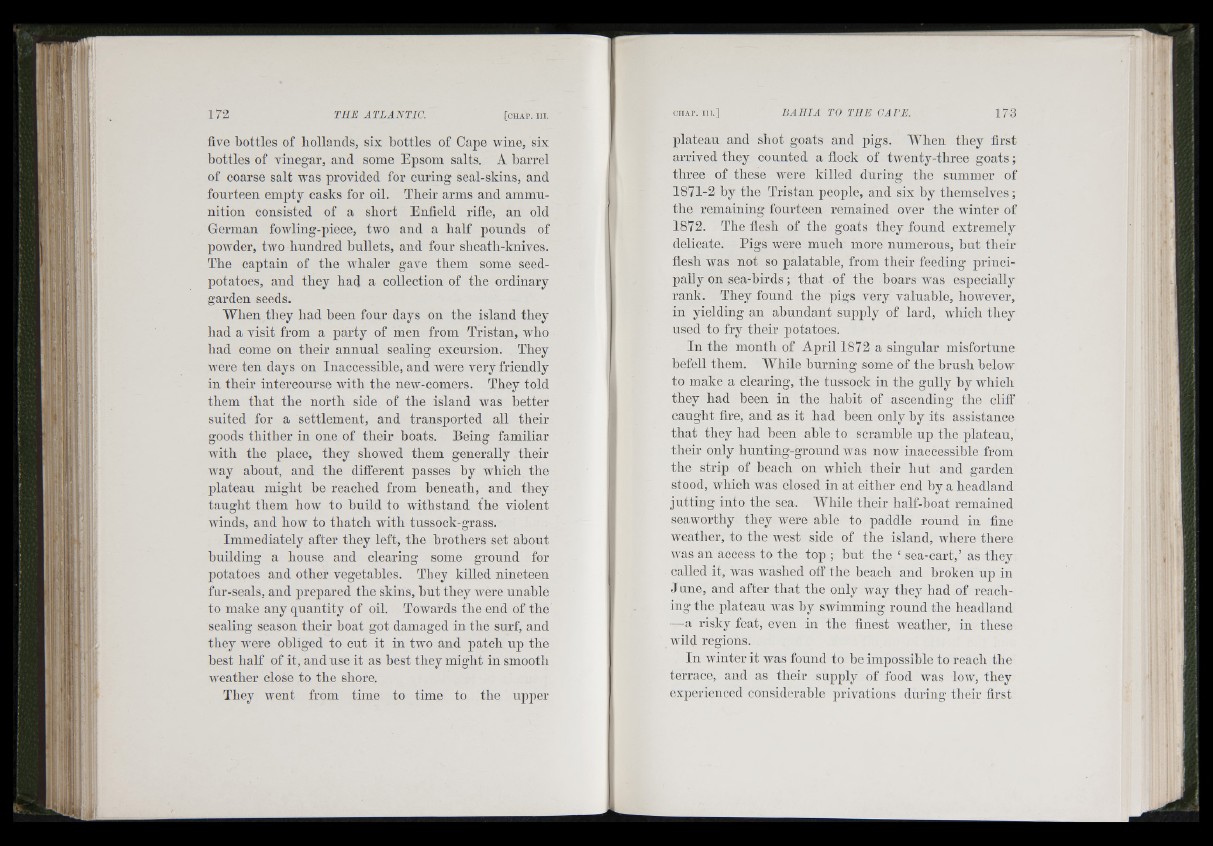
five bottles of liollaiids, six bottles of Cape wine, six
bottles of vinegar, and some Epsom salts. A barrel
of coarse salt was jirovided for curing seal-skins, and
fourteen empty casks for oil. Tlieir arms and ammunition
consisted of a short Enfield rifle, an old
German foAvling-piece, two and a half pounds of
poAvder, tAVo hundred bullets, and four sheatli-knives.
The captain of the Avhaler gaA'e them some seed-
potatoes, and they had a collection of the ordinary
garden seeds.
When they had been four days on the island they
had a visit from a party of men from Tristan, avIio
had come on their annual sealing excursion. They
AA'ere ten days on Inaccessible, and Avere very friendly
in their intercourse Avitli the new-comers. They told
them th a t the north side of the island was better
suited for a settlement, and transported all their
goods thither in one of their hoats. Being familiar
with the jilace, they shoAved them generally their
Avay ahout, and the diiferent passes by which the
plateau might he reached from beneath, and they
taught them hoAV to build to withstand the violent
AAdnds, and how to thatch with tussock-grass.
Immediately after they left, the brothers set ahout
building a house and clearing some ground for
potatoes and other vegetables. They killed nineteen
fur-seals, and prepared the skins, h u t they Avere unable
to make any quantity of oil. Towards the end of the
sealing season their boat got damaged in the surf, and
they AA'ere obliged to cut it in two and patch up the
best half of it, and use it as best they m ight in smooth
Aveather close to the shore.
They Avent from time to time to the upper
B A H I A TO TH E CAPB. 173
2>lateau and shot goats and pigs. dVhen they first
arrived they counted a flock of twenty-three g o a ts;
three of these Avere killed during the summer of
1871-2 hy the Tristan people, and six hy themselves;
the remaining fourteen remained over the Avinter of
1872. The flesh of the goats they found extremely
delicate. Pigs Avere much more numerous, h u t their
flesh Avas not so palatable, from their feeding principally
on sea-birds; th a t of the boars was especially
rank. They found the pigs very valuable, hoAvever,
in yielding an abundant supply of lard, which they
used to fry tlieir potatoes.
In the month of April 1872 a singular misfortune
befell them. While burning some of the hrush heloAV
to make a clearing, the tussock in the gully by which
they had been in the habit of ascending the cliflp
caught fire, and as it had heen only hy its assistance
th a t they had heen able to scramble up the plateau,
their only hunting-ground Avas u o a v inaccessihle from
the strip of beach on Avhich their hut and garden
stood, Avtiich was closed in at either end hy a headland
ju ttin g into the sea. While their half-boat remained
seaworthy they Avere able to paddle round iu fine
Aveatlier, to the Avest side of the island, Avliere there
Avas an access to the top ; but the ‘ sea-cart,’ as they
called it, Avas washed oif the beach and broken np in
June, and after th a t the only Avay they had of reaching
the plateau Avas hy swimming round the headland
—a risky feat, even in the finest Aveather, in these
wild regions.
In A v i n t e r i t w a s f o u n d t o b e i m p o s s i b l e t o r e a c h t h e
t e r r a c e , and a s t h e i r s u p p l y o f f o o d Av a s I oav, t h e y
e x p e r i e n c e d c o n s i d e r a b l e privations d u r i n g t h e i r f i r s t